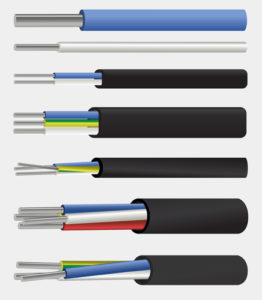 Once the norm due to wartime rationing of copper, aluminum wiring went out of style a few decades ago. Despite the appeal of its low cost, aluminum acquired a bad reputation due to safety concerns. With improved knowledge and methods for installing and maintaining aluminum wiring systems, it is now very possible to have an effective, reliable, and economical wiring solution with aluminum.
Once the norm due to wartime rationing of copper, aluminum wiring went out of style a few decades ago. Despite the appeal of its low cost, aluminum acquired a bad reputation due to safety concerns. With improved knowledge and methods for installing and maintaining aluminum wiring systems, it is now very possible to have an effective, reliable, and economical wiring solution with aluminum.
Aluminum wiring holds the greatest appeal for commercial and industrial applications. The inexpensive, lightweight and pliable conductor offers distinct advantages for large buildings and campuses.
For homeowners, aluminum wiring rarely gets chosen over copper wiring these days. However, with proper inspection and modern repairs, an existing aluminum system can be safely left in place.
Advantages of Aluminum Wiring
Priced at less than half of copper wiring, aluminum brings savings and other practical benefits:
- Low cost. Aluminum has consistently low costs and you can use less of it. Copper requires a greater quantity and is susceptible to changing market prices.
- Easy to work with. Although aluminum should not be firmly bent or kinked, it is very pliable and can be installed quickly and effectively in many difficult locations.
- Lightweight. In industrial settings or anywhere that weight poses a concern, aluminum wiring offers a significant reduction in weight compared to copper.
Disadvantages of Aluminum Wiring
Copper wiring dominates the market because copper has greater durability and fewer safety concerns. Despite the appeal that aluminum holds for many applications, you should be aware of its downfalls. Among the disadvantages of aluminum:
- Fire hazards. When installed improperly or damaged by water or corrosion, aluminum wiring poses an increased risk of building electrical fires.
- Insurance costs. Some insurance companies will not insure a house or building fitted with aluminum electrical wiring. Others may demand a higher premium or insist on special inspections.
- Requires special parts. All screws, lugs, and terminal parts must be approved for compatibility with aluminum. This makes it necessary to always work with an electrician with expertise in aluminum wiring for all installation and repairs.
- Longevity. Overall, aluminum needs to be replaced more often than copper wiring because aluminum is more likely to become corroded or damaged.
If You Have Aluminum Wiring or Want to Install It…
Be sure to work with a licensed electrician who knows the special concerns of aluminum wiring. With proper wiring design and installation, you can get reliable power from aluminum wiring while enjoying the cost savings. Just be prepared for special concerns to arise when repairs are needed and make sure you have things straightened out with your insurance company.
If your home already has aluminum wiring, it does not necessarily need to be replaced. However, you can and should have the electrical system inspected. Aluminum was often installed incorrectly decades ago, leading to the safety hazards and corrosion problems. These issues can be fixed with retrofitted parts and safety precautions that a local electrician can provide.
Cost concerns and project needs will dictate whether aluminum or copper wiring makes the better choice for your home or business. For help planning, installing, and servicing your electrical system, contact us for help from an experienced and expert electrician.

